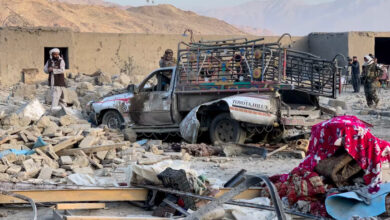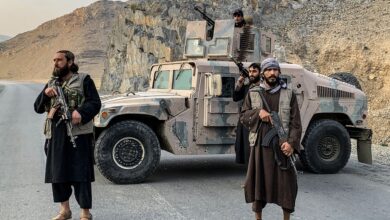Three workers in a polio eradication campaign were shot in Pakistan on Wednesday, and two of them were killed, the latest in a string of attacks that has partially halted the UN-backed global health campaign to stamp out the crippling disease.
Following the violence, the United Nations in Pakistan has pulled all staff involved in the immunization campaign off the streets, spokesman Michael Coleman said.
Wednesday saw at least three separate attacks. In the northwestern district of Charsadda, men on motorbikes shot dead a woman and her driver, police and health officials said.
Hours earlier, a male health worker was shot and badly wounded in the nearby provincial capital of Peshawar. He remains in a critical condition, said a doctor at the Lady Reading Hospital where he is being treated.
Four other women health workers were shot at but not hit in nearby Nowshera, said Jan Baz Afridi, deputy head of the Expanded Programme on Immunisation.
It is not clear exactly who is behind the violence but some Islamists, including Taliban militants, have long opposed the campaign, with some saying it is aimed at sterilizing Muslims.
The Taliban have repeatedly issued threats against the polio eradication campaign and health workers said they received calls telling them to stop working with the "infidels."
But a spokesman for the Pakistani Taliban, Ihsanullah Ihsan, told Reuters his group was not involved in the violence.
On Monday and Tuesday, six female health workers were killed in attacks in the southern port city of Karachi and in Peshawar. The youngest was 17.
The shootings, five of which happened in Karachi, home to 18 million people, led provincial health authorities to suspend the polio eradication campaign in the province of Sindh.
But authorities in Khyber Paktunkhwa province, where the capital is Peshawar, said they would not accept a recommendation to suspend the campaign even as the United Nations ordered their staff to suspend work.
"You know halting the campaign at this stage would create more problems as it's not a one-day phenomenon. If we stopped the campaign it would encourage the forces opposing the polio vaccination," said an official in the province, Javed Marwat.
Despite this, many health workers told Reuters they would not be going to work until the security situation improved.
The Taliban have repeatedly said the campaign is a Western conspiracy to sterilize or spy on Muslims or said the vaccinations could only continue if attacks by US drone aircraft stopped.
Their suspicions increased after it emerged that the CIA had used a fake vaccination campaign to try to gather information about Osama bin Laden, before he was found and killed in a northern Pakistani town last year.
On Wednesday, Pakistan Prime Minister Raja Pervez Ashraf said the campaign needed to go on.
"We cannot and would not allow polio to wreak havoc on the lives of our children," he said in a statement.
Pakistan had 20,000 polio cases in 1994 but vigorous vaccination efforts had brought the number down to 56 in 2012, the statement said.
A global vaccination campaign has eradicated the disease from everywhere except Pakistan, Afghanistan and Nigeria.
Polio can paralyze or kill within hours of infection. It is transmitted person-to-person, meaning that as long as one child is infected, the disease can be passed to others.



